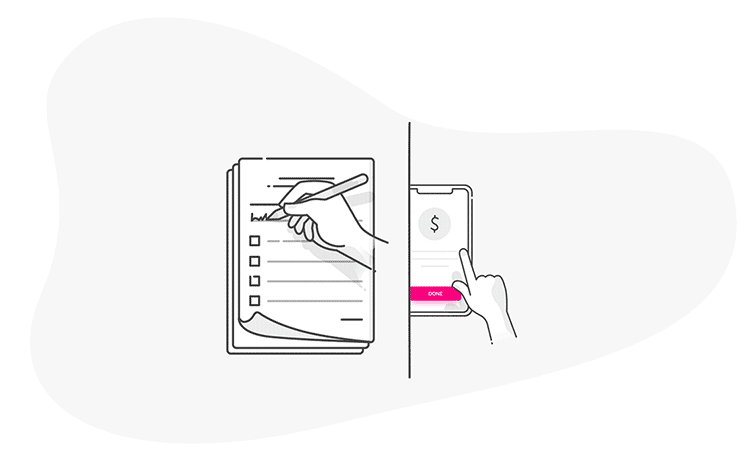- What does renters insurance cover in New Jersey?
- What property damages does New Jersey renters insurance protect me against?
- How much is renters insurance in New Jersey?
- Is renters insurance required in New Jersey?
- What's the right amount of coverage?
- How can I lower my renters insurance rates in New Jersey?
- Getting a Lemonade renters insurance quote in New Jersey
The Garden State gets a bad rap sometimes, but we know it’s beautiful.
To enjoy Jersey with full peace of mind, you’re going to want to make sure you have renters insurance coverage.
Perhaps you’re a college student renting an off-campus house in Princeton or New Brunswick, or a proud beach bum living down in Asbury Park. Maybe you’re a hotshot marketing exec in Hoboken (one of the best cities for young professionals, BTW). Whatever your situation may be, renters insurance can be a great safety net if anything bad happens—like having your bike stolen during an epic ride from Morristown to Mahwah.

Let’s dive into everything you need to know about renters coverage in Jersey.
What does renters insurance cover in New Jersey?
Renters insurance in New Jersey can cover your stuff in a number of unfortunate scenarios, plus cover you if you unintentionally harm another person or their property.
Does it cover your collection of mint-condition Bouncing Souls vinyl? What about your bike? Or your engagement ring? (Hint: renters insurance can cover those things, depending on your policy details.) Other than things you own, what does your policy entail?
Allow us to explain. Here are some key components to your renters coverage:
Personal Property
‘Personal property’ coverage protects your stuff, no matter where you are in the world. So if your living room couch is ruined due to that burst pipe, or your MacBook is snagged while you’re traveling abroad, your policy has your back.
Loss of Use
If you have to leave your home because of covered losses (like a fire or windstorm), your ‘loss of use’ coverage provides reimbursements for a temporary place to crash, and additional living expenses such as food, laundry, hotel parking, and more.
Liability protection
Let’s say you have a dinner party and your pal trips over your toddler’s tricycle. Oof! If someone is injured on your property, or anyone on your policy causes damage to someone else’s property or stuff, your insurer should have you covered.
Medical protection
If your friend needs to go to the hospital because of that slip and fall, your medical payments will kick in. Your insurer covers medical expenses if your guests get injured at your place, or if you accidentally injure anyone outside of your home. But keep in mind that your renters insurance does not cover medical expenses if you or someone living with you are hurt—only non-residents and visitors.
Different people might need different coverage amounts, depending on your lifestyle and situation.
If you have $20,000 worth of personal belongings, you’ll want to get $20k worth of personal property coverage (rather than the $10,000 minimum) to make sure you’re totally covered. Your landlord also might require you to have a certain amount of renters insurance liability coverage. Don’t worry, changing your coverage options is a lot less of a pain than it sounds, thanks to Lemonade’s Live Policy.

What property damages does New Jersey renters insurance protect me against?
Renters insurance can protect your property against several damages (or ‘perils’ in insurance speak), including theft, smoke, falling objects, and water damage from things like a pipe bursting in your Hoboken apartment.
Here’s what’s included under your standard policy in Jersey:
- Fire or lightning
- Windstorm or hail
- Explosion
- Riots
- Aircraft
- Vehicles
- Smoke
- Vandalism
- Theft
- Falling objects
- Weight of ice, snow, or sleet
- Accidental discharge or overflow of water or steam
- Sudden and accidental tearing, cracking, burning, or bulging
- Freezing
- Volcanic Eruption
How much is renters insurance in New Jersey?
As of 2025, the average estimated cost of Lemonade renters insurance in New Jersey ranges from roughly $10 to $15 a month.* However, the amount you pay will depend on several factors, like your deductible, how much coverage you need, and where in New Jersey you live.
Is renters insurance required in New Jersey?
Renters insurance is not required by law in New Jersey, but your individual landlord may require it. And, if that’s the case, you are legally required to comply with your lease.
If your landlord or property manager does require it, you will likely need to provide proof of your policy before you sign your lease. Sometimes, they’ll also ask for proof of insurance each time you renew your lease.
Why? Usually, landlords want to make sure you have enough personal liability coverage within your renters policy. They might also check to make sure you have enough personal property coverage for your stuff.
Your landlord might also require you to include them as an interested party, which means we’d let them know if you cancel your policy. That way, the landlord can make sure you don’t cancel your policy… right after you provide proof that you have one. (Nice try!)
What’s the right amount of coverage?
There’s no one-size-fits-all amount of renters insurance coverage—the amount you choose will depend on your own situation. Your selections will also differ for each coverage type. For example, you should choose your personal property coverage amount based on how much stuff you have, and how much it would cost to replace it all.
On the other hand, when selecting your loss of use coverage, consider all of the expenses you could rack up beyond your normal daily budget (such as a place to stay, food, laundry, your commute, etc) if your home becomes unlivable for an extended period of time. Check out our guide to learn more about how much renters insurance you need.
How can I lower my renters insurance rates in New Jersey?
Renters insurance is generally quite affordable, but there are still some ways you can cut down on costs. Let’s look at a few.
Look for discounts
Many insurers offer certain discounts that can help reduce your renters insurance premium. At Lemonade, we offer discounts for the following:
- Security devices: Check to see if your rental property has a fire alarm or burglar alarm—you could qualify for a discount.
- Bundling: One of the easiest ways to save money on your renters insurance is to bundle it with our pet insurance. When you bundle your policies, you’ll be eligible for a Lemonade bundle discount on each policy.
- Paying in full: Paying your annual premium in full rather than month-to-month will earn you a discount with many insurance providers, including Lemonade.
Adjust your deductible and coverage amounts
Raising your deductible (aka the amount you’d have to pay out of pocket if you need to file a claim) will automatically lower your premium. Lowering your total coverage amount will also save you some money.
Just make sure that your stuff is still adequately covered should disaster strike, and that you have enough liability coverage in the event that you accidentally injure another person or their property.
Want even more in-depth info on Lemonade and its insurance policies? Check out this handy FAQ!
BTW: We also offer pet insurance and life insurance in New Jersey, if you want the convenience of insuring everything under one roof!
Getting a Lemonade renters insurance quote in New Jersey
Truth is, signing up with many insurance companies can be a drag.
But not with Lemonade! We’ve harnessed artificial intelligence and digital tools to create the most pleasant insurance experience possible. Just head to the Lemonade app, answer a few questions, and AI Maya will crunch some numbers and give you a renters insurance quote instantly. Zero paperwork or phone calls required.
If you ever need to tweak your coverage because your landlord asked you to, or if you realized your stuff is worth way more than you thought, you can do it on the app instantly using Lemonade’s Live Policy feature.
And Lemonade’s claims experience is instant, too. If anything bad happens, simply chat with AI Jim, our claims handling bot, and quickly tell him what happened. 30% of our claims are approved in just 3 seconds.
Best part? All leftover premiums go to a charity you choose at the end of the year through our Giveback program.
How? Rather than making money by denying insurance claims, we take a fixed fee out of your monthly payments, pay reinsurance (and some unavoidable expenses), and use the rest for paying out claims. Then, we donate unclaimed remainders in our annual ‘Giveback‘.
This way, our Lemonaders enjoy amazing coverage, and society gets a little push for the better. It also means that, unlike traditional insurance companies, we’re not in conflict with our customers, so we’re happy to pay claims quickly and with no hassle.
*Lemonade Insurance analyzed policy rates to calculate average renters premiums as of January, 2025. This analysis is based on Lemonade’s internal data and is meant for illustrative purposes only; quotes may vary depending on individual circumstances.
A few quick words, because we <3 our lawyers: This post is general in nature, and any statement in it doesn’t alter the terms, conditions, exclusions, or limitations of policies issued by Lemonade, which differ according to your state of residence. You’re encouraged to discuss your specific circumstances with your own professional advisors. The purpose of this post is merely to provide you with info and insights you can use to make such discussions more productive! Naturally, all comments by, or references to, third parties represent their own views, and Lemonade assumes no responsibility for them. Coverage and discounts may not be available in all states.




